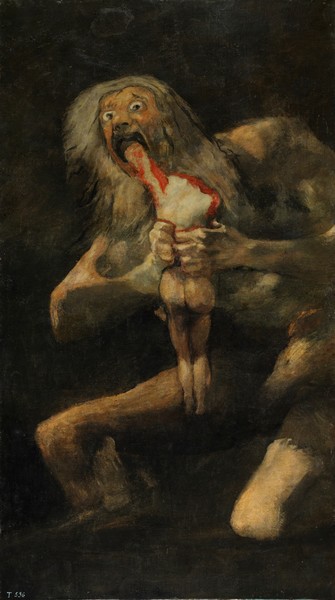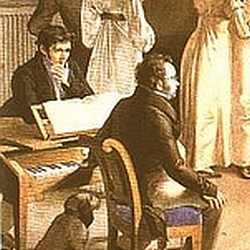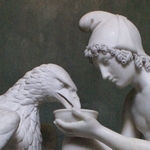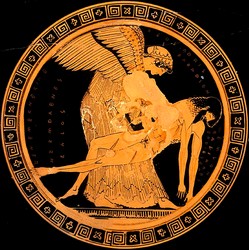
Some songs reach my notebook with a rough publication date. Others are listed regarding a thematic content, just in case Christmas, Easter or Saint George's Day arrive and I don't have any idea at the ready. Then, I keep a general list, with songs which arrived from different ways: some of them, I've heard again recently; others are a new discovery and others are recommendation from friends. But there are songs that I don't need to write down on the notebook, because, sooner or later, I’ll talk about them. They are my favourites songs, and they’re only waiting for the right moment. When I first read the programme that baritone Konstantin Krimmel and pianist Doriana Tchakarova had prepared for the Schubert Lied series I just knew it was time for Gruppe aus dem Tartarus, what a great song!
As I told you when I talked about Die Götter Griechenlands, Friedrich Schiller shared the love for Ancient Greece that prevailed in German culture in his time, and Gruppe aus dem Tartarus [Group from Tartarus] also refers to mythology. The Underworld, often known by the name of his god, Hades, was the place inhabited by the dead; receiving no punishment or reward. Much deeper, according to Zeus at the Iliad, as far from the Hades as the sky is from the earth, there Tartarus was. And there, its inhabitants suffered the most horrific tortures. Those who had offended the gods were sent there after their death; As we all know, the gods were vindictive, thin-skinned and intolerant to those who committed the same abuses as they did, so Tartarus was full up. Eventually, the place evolved towards something like the Christian hell (the Elysium was the place for virtuous people), but, originally, it was meant to punish those defeated by the gods, and the first occupants were the titans. That's what happens if you lose the war.
Living mortals hardly ever visited the Hades, that was only within the grasp of some heroes, as Odysseus, or someone as motivated as Orpheus. Even less that someone visited the Tartarus, and apparently, Schiller was inspired by the Aeneid scene in which Aeneas goes there guided by the Sybil. The poet involves us from the very first word, "Horch" [Listen], and shows the unbearable pain suffered by the condemned; He also mentions the Cocytus, the river nourished by their tears, and the bridge that seems their only hope. But reality is relentless, they will remain there the whole eternity.
Between August and November 1817, Schubert returned to Schiller’s poems after a year and a half, writing seven Lieder, the second of which was Gruppe aus dem Tartarus, D. 583 (the next one was Elysium, so, hell and heaven). He had already tried a first version that remained unfinished, the D. 396; that time he succeeded, and how! I’ve told you, it was a great song: original, adventurousness, using declamation and harmony in a way that anticipated Wagner and Wolf in a few decades. And the most important: Schubert achieves to convey the poem anguish the very same way he did with Gretchen am Spinnrade or Erlkönig.
Schiller's poem has three stanzas, the first and last of four verses and the second of six; Schubert composes a Lied durchkomponiert in which we can distinguish five different parts that take us from the initial call, "Horch", to the word "Ewigkeit" [Eternity] which opens the last two verses. The tremolandi of the prelude, leading to both the murmur of the sea mentioned in the first verse and the terror of the condemned, covers the declaimed first stanza; The following three verses describe pain and despair. The melody didn't seem important until now, but in the next three verses, it takes a prominent role; I was wondering if you agree with me, but I feel compassion in those phrases. At the first two verses in the third stanza we hear the convicted who are wondering if their suffering has come to an end. First, they ask in a low voice, as the poem says, but in a second time, they raise their voice, and in a third time even more, until we hear the narrator in the last two verses, to remind us that the sentence will last forever. And then, again, the tremolandi. At the prelude, they began in piano and arrived until the fortissimo, now it's the other way around, they decrease until the pianissimo. As Aeneas, we arrived at the Tartarus and see the condemned up close; now, we are moving away and can hear their moaning increasingly distant.
Before listening to the music, let me do some explaining about this mythological mess. In his poem, Schiller mentions Saturn and his scythe; Saturn is the Roman god related to farming and time and his Greek equivalent is Chronos. Due to the names’ similarity, he was assimilated to Titan Kronus, who originally carried a scythe, but, believe me, not meant for work. I'm taking advantage of this confusion to illustrate this article with an incredible picture, Saturn devouring his son (painted by Goya some years after Schubert composed the Lied), which reminds us of Titan’s best known achievement. He devoured all his new-born children except the youngest, Zeus (who compelled his father to disgorge all his brothers alive).
Krimmel and Tchakarova's song recital, which will be held tomorrow at L'Auditori in Barcelona, will be entirely dedicated to lieder with poems by Friedrich Schiller; It's a quite unusual programme and we're discovering wonderful gems. For now, you could listen again to the three Schiller songs we've listened so far and, of course, to Gruppe aus dem Tartarus. Tomorrow we will enjoy the version of a duo who are beginning their career and I’d suggest that now, we also listen to another one who were also starting when they recorded it: Simon Keenlyside and Malcolm Martineau.
Horch – wie Murmeln des empörten Meeres,
Wie durch hohler Felsen Becken weint ein Bach,
Stöhnt dort dumpfigtief ein schweres – leeres,
Qualerpresstes Ach!
Schmerz verzerret
Ihr Gesicht – Verzweiflung sperret
Ihren Rachen fluchend auf.
Hohl sind ihre Augen – ihre Blicke
Spähen bang nach des Cocytus Brücke,
Folgen tränend seinem Trauerlauf.
Fragen sich einander ängstlich leise,
Ob noch nicht Vollendung sei?
Ewigkeit schwingt über ihnen Kreise,
Bricht die Sense des Saturns entzwei.
Hark - like the murmuring of the angry sea,
like a brook weeping through hollow, rocky gullies,
you can hear over there, deeply muffled, a heavy, toneless
groan, extracted with torment!
Pain contorts
their faces, despair opens
their jaws with curses.
Hollow are their eyes: their gaze
rests anxiously on Cocytus' bridge,
and they follows Cocytus' sad course with tears.
They ask one another softly with fear
whether the end has not yet come!
Eternity whirls above them in circles,
breaking Saturn's scythe in two.
(translation by Emily Ezust)



 Ho...
Ho...












Comments powered by CComment